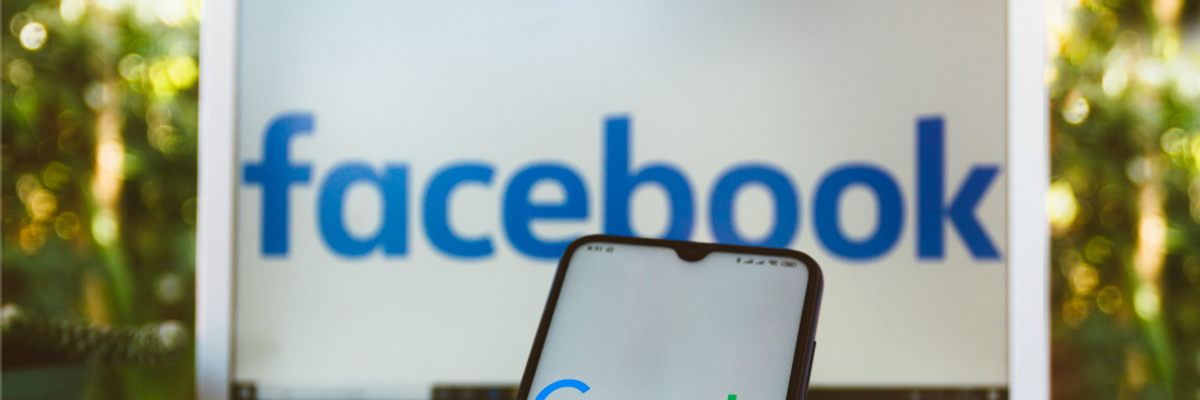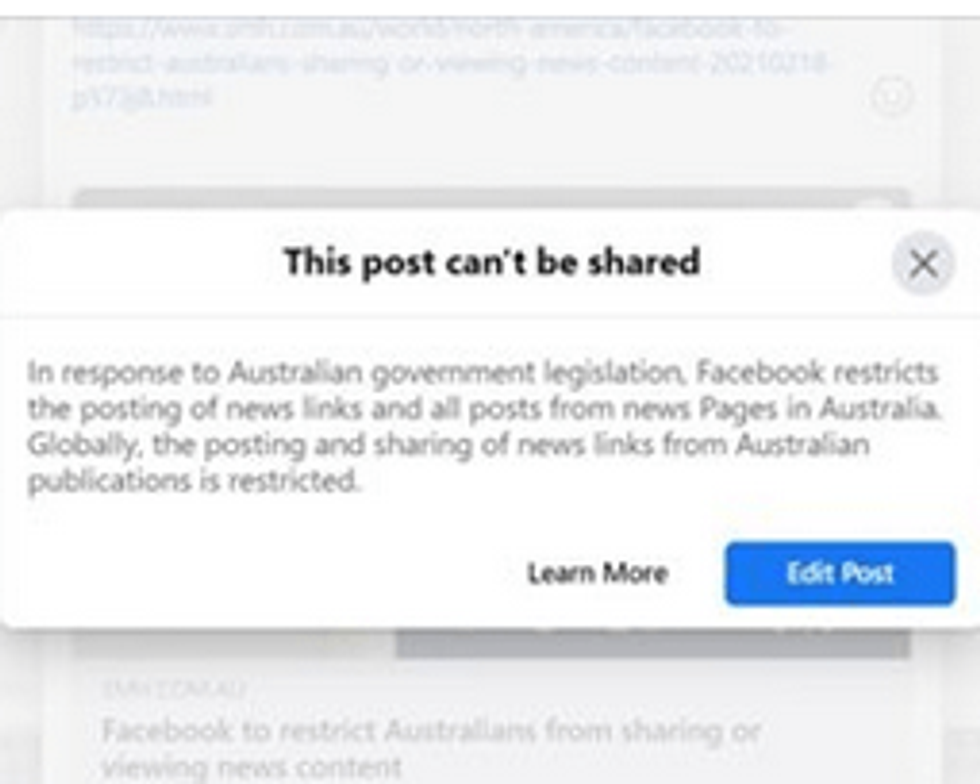Amnesty International expressed concern Thursday after Facebook blocked the content of Australian news outlets from its platform--a move the social media giant took in response to a proposed law to make large technology platforms pay publishers for linking to Australian news stories.
"It is extremely concerning that a private company is willing to control access to information that people rely on," said Amnesty International Australia campaigner Tim O'Connor in a statement.
"Facebook's action," he continued, "starkly demonstrates why allowing one company to exert such dominant power over our information ecosystem threatens human rights."
At issue is the "News Media and Digital Platforms Mandatory Bargaining Code," which is still awaiting passage in the Senate. It purports "to help support the sustainability of the Australian news media sector by addressing bargaining power imbalances between digital platforms and Australian news businesses."
According to NPR:
Under the proposed Australian legislation, tech platforms would have to negotiate with publishers over access to links to news stories. If no deal is reached, the tech companies and media organizations would move to arbitration. In addition, the bill requires platforms to give news outlets notice when algorithms are changed that may affect the visibility and reach of news stories.
Facebook, for its part, said in a statement Wednesday that the plan "fundamentally misunderstands the relationship between our platform and publishers who use it to share news content" and "has left us facing a stark choice: attempt to comply with a law that ignores the realities of this relationship, or stop allowing news content on our services in Australia."
Google--the other platform the legislation targets--reached a deal this week "in the hope that it can avoid laws that tell it what to pay include the threats of arbitration and fines," as the Columbia Journalism Review's Mathew Ingram put it.
The deal with Rupert Murdoch's News Corp, CNN Businessreported, will "allow that media organization's US, UK and Australian publications to participate in News Showcase, a new product in which publishers can curate and decide for themselves how to present their content on the platform. Google has committed $1 billion over three years to the program."
Facebook took a different approach and instead "chose the nuclear option rather than bargain with news publishers in Australia," NPR reported.
Facebook's action Wednesday went beyond a "news blackout," as the Wall Street Journal reported, because the social media behemoth "also cut off access to information such as the national weather service and some local health sites, though Facebook said that had been done inadvertently."
As Bloomberg News noted:
The pages for the Queensland and South Australia health services were among those affected, preventing them from serving Covid-19 information days ahead of a national vaccination program rollout. Australians were also prevented from accessing Foodbank Australia, Women's Legal Shelter, the sites of some politicians and emergency service departments as well as the Australia Council of Trade Unions. Even wildlife-preservation group WWF Australia was caught up in the sweeping measure.
"Facebook blocking Access Now and other organizations in Australia is not a reaction to a bad draft law, but a flex: Facebook wants to control the narrative, and they want world leaders and users to take note."
--Melody Patry, Access NowAmnesty's O'Connor called the broad sweep "alarming" and said that "Facebook's willingness to block credible news sources also stands in sharp distinction to the company's poor track record in addressing the spread of hateful content and disinformation on the platform."
"Amnesty International USA calls on Facebook to immediately reverse this decision," he said.
Melody Patry, advocacy director at digital rights group Access Now--which also saw its page blocked Wednesday--was similarly critical of Facebook's blackout.
"Facebook blocking Access Now and other organizations in Australia is not a reaction to a bad draft law, but a flex: Facebook wants to control the narrative, and they want world leaders and users to take note," she said.
"When Big Tech's gatekeeper power is unchecked or a handful of dominant publishers can influence legislation," said Patry, "we get caught in a battle where users always lose."
As author and lawyer Lizzie O'Shea sees it, the proposed law is fundamentally flawed, in part because "it aimed to align media organization and tech platforms against the interests of users." In an article at Australian literary magazine Overland, she added:
Media organizations have demonstrated that they are perfectly fine with exploiting user data for ad dollars, so long as they are not left out of the game. What does it say about tech policy in this country that the human rights of users were almost entirely left out of the conversation? Or that the invasive and exploitative practices of surveillance capitalism, which many people deeply resent, were not merely left untouched by the media code, but indeed entrenched, given that media organizations would have a vested interest in partaking in them?
What's more, "the proposed code was not about protecting the many organizations that generate content and are now contending with blank Facebook pages," wrote O'Shea. "Instead, this was tech policy-making driven by large news media companies who saw the opportunity to extract value from an unpopular opponent."
Another critic of the proposal is World Wide Web founder Tim Berners-Lee.
In a submission to Australia's Senate last month, Berners-Lee acknowledged "the right of publishers and content creators to be properly rewarded for their work," but warned that the code "risks breaching a fundamental principle of the web by requiring payment for linking between certain content online."
He said that the "ability to link freely--meaning without limitations regarding the content of the linked site and without monetary fees--is fundamental to how the web operates, how it has flourished till present, and how it will continue to grow in decades to come."
"If this precedent were followed elsewhere," Berners-Lee added, "it could make the web unworkable around the world."


